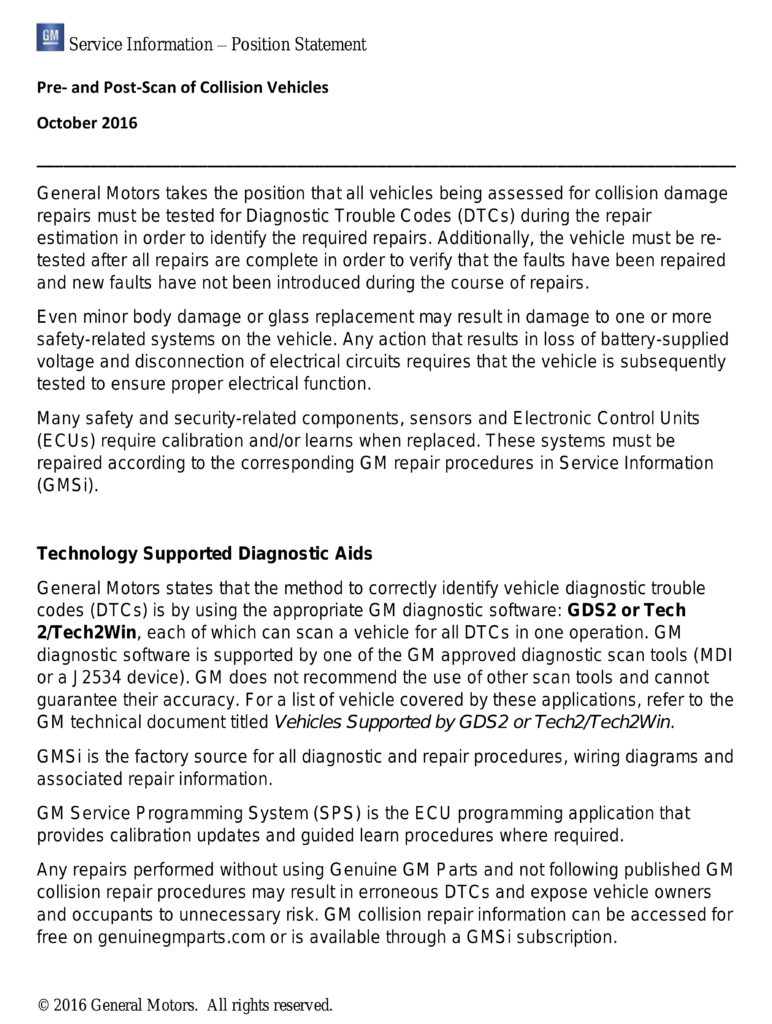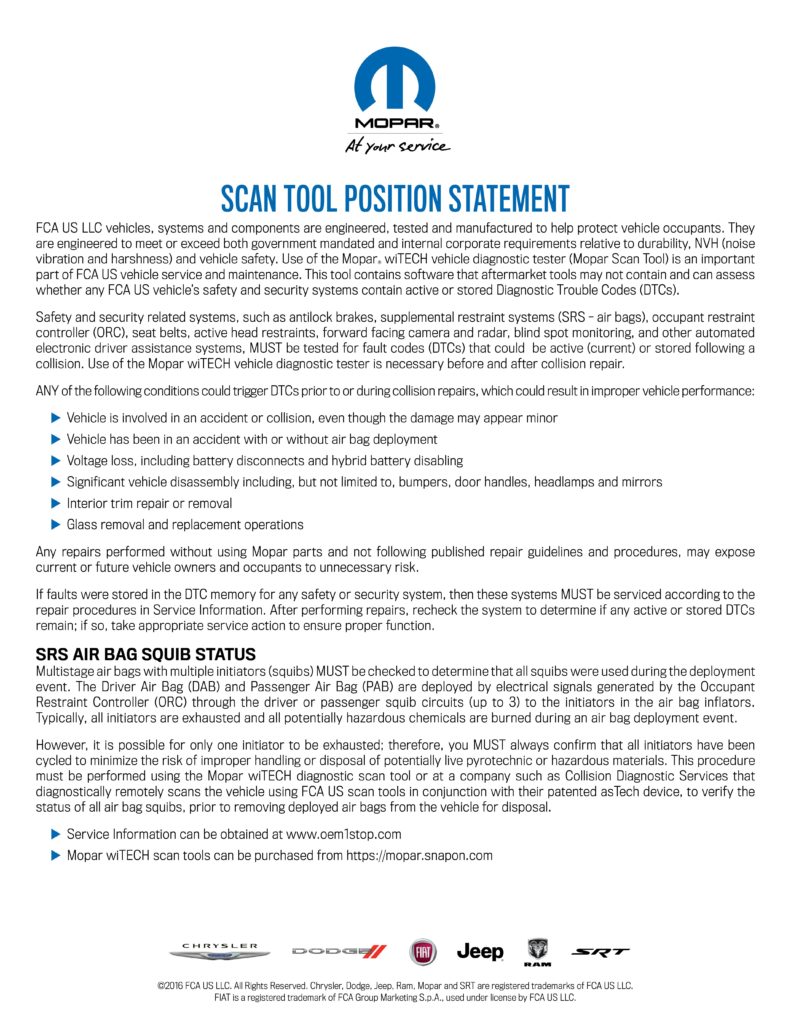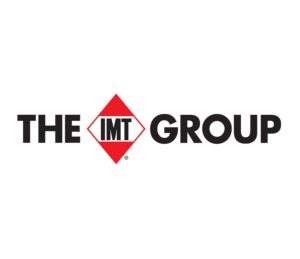
Repairer’s notes, emails contradict IMT’s response to Iowa Insurance Division on scan complaint
By onBusiness Practices | Insurance | Legal | Repair Operations | Technology
Update: The Iowa Insurance Division explained March 21 that spokesman Chance McElhaney went on paternity leave at about the same time as his initial March 6 response and our follow-up questions that day and March 8. Out of fairness, the story has been updated to remove references to specific inquiries going unanswered.
An Iowa collision repairer’s correspondence calls into question statements in a letter by the IMT Group that apparently persuaded the Iowa Insurance Division to close the shop’s complaint against the carrier.
“We forwarded a copy of your initial complaint and supplemental information to IMT Insurance Group (“IMT”) and requested a response to your concerns,” IID market regulation analyst Ron Peters wrote Jan. 6 to Precision Collision. “Enclosed is the company’s corresponding response in which they have addressed each of the six individual customer vehicles that you identified in your December 12, 2016, email.”
The same letter indicated the IID would close the case without any action against IMT.
Precision Collision estimator Mark Jaeger had complained to the agency in October 2016 following recent IMT refusals to pay for scans of FCA and General Motors vehicles dating back to the 2012 model year. In November 2016, the agency asked for specific claim numbers so that IMT could respond.
Jaeger sent them six claim numbers and/or customer names. One was paid by the insurer, and is therefore moot. One was in the process of being repaired.
But IMT senior claims manager Jim Todd’s account of the other four — in a letter that was carbon-copied to IMT CEO Sean Kennedy, Vice President of claims Chris Owenson and claims director Tim Welch — is where the repairer’s and insurer’s stories really differ.
Unfortunately, the insurance department assured Jaeger that any records of the shop and carrier’s interactions would be provided by the insurer, and not to bother with sending his own documentation.
“I am not sure how much documentation you need, I have saved many of these emails, and I have copies of ‘letters’ that were sent to us, I also can send you all the documentation I’ve sent IMT supporting the need for scans among the other disallowed items,” Jaeger wrote Dec. 12, 2016. “If you could please respond to this email and let me know that you’ve received it and what other documents you require, I would be happy to send those.”
“We will not need the documentation you mentioned as the company should already have it,” Peters wrote Dec. 14, 2016.

Notes and emails provided by Jaeger to Repairer Driven News directly contradict the account in Todd’s Dec. 29, 2016, letter to the agency.
Asked for comment on the discrepancy, Todd wrote in an email: “It is the The IMT Group’s policy to NOT comment on pending regulatory matters. We have no comments in response to your inquiry.”
Contacted to learn more about the Iowa Insurance Division’s positions regarding the complaint, IID communications director Chance McElhaney wrote in an email: “The Iowa Insurance Division’s authority is to review the appropriateness of the claims handling procedures. The disputes over coverage are private disputes that need to be resolved directly between the claimants and the insurance companies. We have no authority to resolve these disputes.”
Below are the IMT description provided to the agency, followed by what Jaeger’s notes indicate. Customer names and claim numbers have been redacted for privacy here even though they’re part of the Iowa public record. Discrepancies are italicized.
FCA and General Motors position statements call for pre- and post-repair scans regardless of the damage. That said, we’ve also provided the number of repair order hours and estimate costs for additional context into the severity of the four claims. These weren’t sub-deductible hits; all four exceeded average repairable claims costs typically reported by CCC and Mitchell — further supporting Precision Collision’s stance regardless of position statements.
Asked for comment about the apparent discrepancies in his account to the state of Iowa and what Precision Collision’s notes indicate, Todd wrote in an email Monday: “It is the The IMT Group’s policy to NOT comment on pending regulatory matters. We have no comments in response to your inquiry.”
Customer 1: 29.7 repair order hours, $4,016.08 estimate
IMT to IID, Dec. 29, 2016: “Our insured has a 2015 GMC. On Sept. 26, 2016 we discussed with the shop that General Motors did not have a ‘position statement’. There were no Malfunction Indicator Lights (“MILs”), no visible electrical damage, and no airbags deployed. We told the shop that we did not see a need for vehicle health scans. Wadena emailed our estimate to the shop on September 27, 2016. We were unaware of any further issues regarding repairs as we never heard from the shop again about this job, nor did we receive a supplement from the shop.” (Emphasis added.)
Precision Collision notes and emails, OEM statements, September 2016-January 2017: On Sept. 26, 2016, Jaeger emailed a senior field claim representative about GM’s August 2016 announcement that it was working on a position statement and agreement that a dash light wasn’t a diagnostic tool.
The IMT claims rep on Sept. 27 acknowledged this, wrote “I have forwarded it to our Physical Damage department for review,” and provided an estimate. On Sept. 28, notes indicate Jaeger called the insurer to say that he agreed with most of the estimate.
On Oct. 7, 2016, Jaeger called IMT to tell the insurer he’d forgotten to send a scan invoice and emailed it to them.
On Oct. 14, he emailed the IMT rep to see if she needed any other information on the claim, as he hadn’t seen a check.
Jaeger left a message for the IMT rep on Oct. 17.
On Oct. 18, the IMT senior field claims rep emailed Jaeger that IMT would not pay for his pre-repair scan “as it is not necessary.”
General Motors on Oct. 21, 2016, issued a position statement validating Precision Collision’s scanning of “all vehicles being assessed for collision damage repairs.” The document also states “the vehicle must be retested after all repairs are complete.”
On Oct. 25, Jaeger emailed the claims rep a copy of GM’s scan position statement.
“Again I’ve sent you this documentation, I’ve proven it’s required, that we’ve done it, and once again if we’re going to do the ‘We don’t pay for that’ then I’ll need a copy of the policy that states that, I’ll also need a representative from IMT to sign this scan authorization (just initial next to the refusal portion and sign and date) If we don’t do this and something happens we need proof that IMT knows more than General Motors,” Jaeger wrote.
On Jan. 10, Precision Collision contacted the IMT rep again about a missing $733.65 it said IMT owed the shop.
Customer 2: 29.8 repair order hours, $4,554.11 estimate
IMT to IID, Dec. 29, 2016: “Our insured has a 2012 Chrysler. Wadena Insurance Company prepared an estimate on October 26, 2016 and sent it to Precision Collision. There were no MILs, no visible electrical damage, and no airbags deployed. On November 4, 2016 we received a supplement for various items, including vehicle scans. We paid for some of the items, but not the scans as we did not authorize them and we did not feel that they were needed, given the scope of damage to the vehicle.” (Emphasis added.)
Precision Collision notes and emails, OEM statements, June 2016-January 2017: Chrysler in June 2016 issued a position statement stating that “Use of the Mopar wiTECH vehicle diagnostic tester is necessary before and after collision repair.”
On Oct. 26, 2016, Jaeger wrote to a different IMT claims representative, stating “Chrysler requires this vehicle to be scanned before and after repair.” He also indicates that a radiator support and headlight are to be replaced, two conditions which Chrysler suggests could trigger diagnostic codes.
“If you wish to not pay for the scans then I will need someone to sign this Scan authorization (just initial by the NO and sign and date) and return to me, I have to scan this vehicle as a matter of liability, so we will continue on as such,” Jaeger wrote. “I will need this cleared up to reach an agreed price before we release this vehicle to the customer.”
On Oct. 27, the IMT rep emailed Jaeger: “Wadena/ IMT will not be signing anything in regards to a scan. It is not necessary (at this time) in order to put the vehicle into pre loss condition. Once the repairs are paid for, per our estimate, I anticipate that you will release the vehicle to the vehicle owner and cannot hold it from the customer.
“Please let me know if we are not able to come to an agreed upon price for the repairs, as I will need to let the customer know and give them a heads up that they may be responsible for out of pocket expenses if they still choose to repair at your shop.”
On Oct. 28, Jaeger called the IMT rep. His notes on that conversation:
“So, the scan, you say it is not necessary to return the vehicle to pre loss condition, how do you anticipate we will get these fault codes removed? Are you saying these codes were all there before the loss? And I’m sure you are aware that I have to scan this vehicle (I am the repair professional, and Mopar has a statement that explicitly requires it be done). I wonder what the customer will think when I show her your email, stating that Wadena/IMT will not sign the scan authorization nor will they pay for the scan when she has already read the OEM position statement, been informed of what the scan does and has signed the authorization. … Your actions of not signing just prove that you know it’s needed, otherwise what harm could come from signing a piece of paper that may put the liability on you? I would also like a copy of the portion of her policy that states you don’t need to clear fault codes after a loss and repair.”
On Oct. 28, an IMT claims supervisor told the shop that IMT “would not be compromising on any of these items without a prior discussion. At that point, or adjuster will prepare an estimate per our estimating guidelines and work with you on those items that may warrant a further discussion.
“We will be contacting our Insured and advising them that there may be some potential out of pocket expenses.”
On Nov. 1, Jaeger called the rep again. His notes indicate he asked for “a documented reason for every disallowed item” and that Precision “sent you documentation for every request (other than those that are in the p-pages).”
A Nov. 3 Collision Diagnostic Services completion scan found 18 faults in 10 modules (and a blown radio fuse).
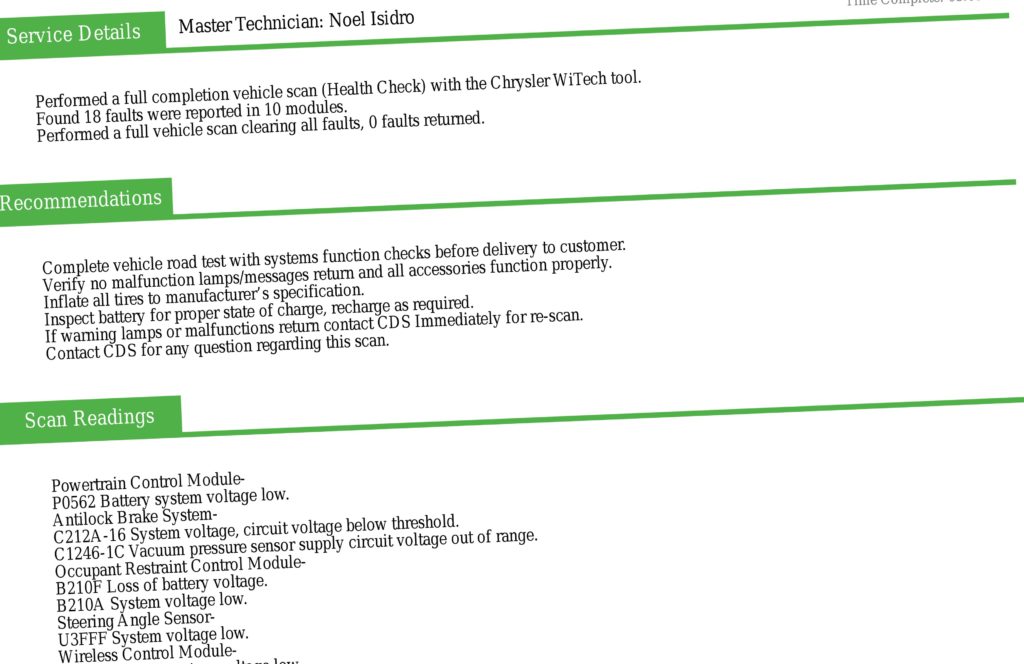
On Nov. 4, Jaeger’s notes indicate he called the rep and provided the scan invoice and other bills.
On Dec. 28, the notes indicate the shop called the IMT rep and asked for payment. On Jan. 6, 2017, it emailed her again.
On Jan. 20, 2017, the shop called the IMT rep again about a supplement check that didn’t match one it received from her.
Customer 3: 55.8 repair order hours, $6,864.22 estimate
IMT to IID, Dec. 29, 2016: “Our insured has a 2012 Dodge. We inspected this vehicle at the shop and had a discussion with the shop as to the scope of the damage. Our adjuster explained that we were not going to pay for the vehicle scans for this particular loss due to the type and extent of damage. There were no MILs, no visible electrical damage, and no airbags deployed. We then sent our estimate to the shop. We were unaware of any further issues regarding repairs as we never heard from the shop again about this job, nor did we receive a supplement from the shop.” (Emphasis added.)
Precision Collision notes and emails, OEM statements, June 2016-January 2017: On Nov. 14, 2016, Jaeger called IMT and presented a preliminary estimate.
On Nov. 18, an IMT staffer denied the scans and was expected to email an estimate sometime in the future.
On Dec. 8, Jaeger left a message for the IMT staffer.
On Dec. 9, 2016, Jaeger sent a supplement and numerous photos. On Dec. 12, he discussed potential mechanical issues with IMT.
On Dec. 21, Collision Diagnostics Services performed a completion scan. They found 15 faults in 3 modules.
On Dec. 22, Jaeger sent the supplement of record, the scan report and invoices to the company.
On Dec. 27, IMT sent a final estimate.
On Jan. 11, 2017, Jaeger called the IMT staffer and left a message.
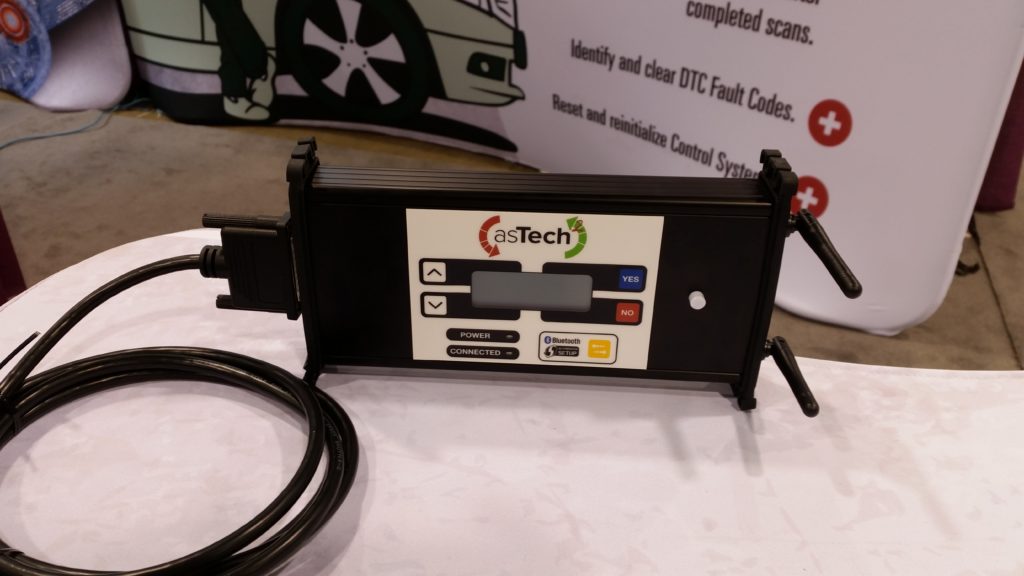
Customer 4: 37 repair order hours, $4,396.48 estimate
IMT to IID, Dec. 29, 2016: “Our insured has a 2014 Buick. We inspected the insured vehicle and sent our estimate to the shop (without any discussion about the repairs). There was no General Motors ‘position statement’ at the time. There were no MILs, no visible electrical damage, and no airbags deployed. Precision Collision never asked us about vehicle scans or mentioned it otherwise. We were unaware of any further issues regarding repairs as we never heard from the shop again about this job, nor did we receive a supplement from the shop.” (Emphasis added.)
Precision Collision notes and emails, OEM statements, October 2016-January 2017: The loss occurred Oct. 10, 2016. The earliest note listed is Oct. 25 — four days after General Motors issued its “pre- and post-scan all vehicles” position statement. An Auto Damage Appraisers of East Iowa estimate lists a contact date of Oct. 26.
On Oct. 28, Jaeger contacted the appraisal company. Later that day, one of its appraisers provided an estimate, noting, “I realize there is a large discrepancy but this is where I ended up.”
While not contained directly in the notes provided to Repairer Driven News, Jaeger recalled in an email that he gave the appraiser a copy of the position statement during his visit either Oct. 31 or Nov. 1.
On Nov. 2, the appraisal company emailed Precision Collision, noting “I’m not sure what you have done as far as the scans, but if they are performed we can always submit that cost as a supl.if we can show there are some issues.”
On Nov. 3, the appraisal company emailed Jaeger, noting that any supplements needed prior approval from it and documentation supporting the work.
On Nov. 19, Precision Collision contacted the appraiser about the remaining balance. On Nov. 23, the appraisal company said it received the supplement and would have a review of it done by the end of the weekend.
Finally, on Jan. 27, 2017, the shop contacted the appraiser wondering why no payment had been issued and asked what else needed to be provided.
IMT policies
If Precision Collision’s notes are accurate, they call into question either IMT senior staff’s account to the Iowa Insurance Division or what the executives were told by underlings in producing those responses. Neither scenario reflects particularly well upon the carrier.
IMT’s dismissal of the need for diagnostic scanning in the face of the collision severity indicated by the estimate costs and repair hours also casts doubt upon IMT and at least one of its third party appraisers’ capability to estimate damage for IMT’s policyholders.
Besides calling into question the regional carrier (and the insurance division), the dispute also reflects the importance of shops keeping good notes. In this case, the Iowa Insurance Division unfortunately relied primarily on IMT’s notes — but the shop’s documentation could be useful in a formal courtroom, which was the IID’s suggestion for resolving the dispute anyway.
More information:
Iowa Insurance Division response
Emails between Precision Collision, IMT, IID
Precision Collision Customer 1 claim information
Precision Collision Customer 2 claim information
Precision Collision Customer 3 claim information
Precision Collision customer 4 claim information
Images:
The IMT Group’s logo is shown. (Provided by the IMT Group)
A damaged vehicle sits outside of Precision Collision in Manchester, Iowa. (Provided by Precision Collision; redaction by Precision Collision)
General Motors, the nation’s No. 1 auto producer, in 2016 issued a position statement requiring all collision repairers to scan vehicles before and after every repair. (Provided by General Motors)
FCA confirmed in 2016 auto body shops, glass replacers and even someone disconnecting a battery must scan a vehicle before and after every repair. (Provided by FCA)
A Collision Diagnostic Services scan report for a Precision Collision customer is shown. (Provided by Collision Diagnostic Services)
Collision Diagnostic Services’ asTech2 scanner is shown at NACE 2016. (John Huetter/Repairer Driven News)

